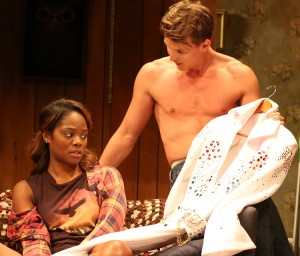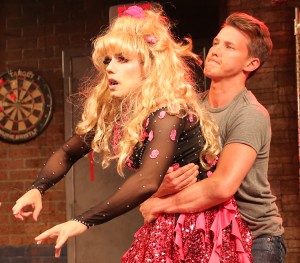Why should one have to go to the movies to see uncommonly attractive people flirt, fall in love, botch their relationship, have their heart broken but maybe live happily ever after anyway? Playwright Douglas Lyons has brought that beloved cinematic staple, the romantic comedy, to the stage with Table 17.
The Connector
The recent revival and reworking of I Can Get It For You Wholesale by Classic Stage Company brilliantly demonstrated the possibility of staging a riveting musical with an unlikable and irredeemable protagonist—in that case, the avaricious garment-industry upstart Harry Bogen. Now composer-lyricist Jason Robert Brown and book writer Jonathan Marc Sherman showcase their own antihero with the new musical The Connector at MCC, featuring wunderkind journalist Ethan Dobson (Ben Levi Ross) as the show’s despicable, win-at-all-costs centerpiece. Daisy Prince, who directs, is credited with having conceived the story.
Wet Brain
Memory, when conveyed on stage, traditionally arrives in the form of a flashback, or a soliloquy. But in John J. Caswell, Jr.’s frantic and surreal family drama Wet Brain, memory is a foreign object to be cut from the stomach, or a hypersonic shared experience that blasts through outer space even as it is grounded in that most triggering of locales, the family room in the house of a decidedly dysfunctional brood.
Bees & Honey
Romantic relationships can be a bushel of complex emotions. In her new play, Bees & Honey, Guadalís Del Carmen explores the intricacies of a Dominican American couple living in the Washington Heights neighborhood of New York City. The play begins with a segment in which its two principals talk about Juan Luis Guerra’s bachata song, “Como Abeja al Panal” (i.e., “like a bee to its honeycomb”), which inspired the title Bees & Honey. The composer Guerra, as described in the play, “is and will always be the Beethoven of Latin America.”
Only Gold
A cast of 20. An original story, not based on a book or movie. Plenty of dancing. Few modern musicals have all these things, and that Only Gold does indicates the breadth of its ambition. Set in Paris in 1928, the show features an ensemble in near-constant motion on an art deco–styled stage with a long, winding staircase whose banister extends into a circular fixture suspended above the stage amid a sky of globular lights. In design and concept it’s a very ambitious project indeed.
Soft
At its core, Donja R. Love’s powerful drama Soft has a certain familiarity. It is a variation on The Blackboard Jungle or Up the Down Staircase—but with a more ruthless, 21st-century demeanor. Its teenage characters have moved beyond the troubled inner city to incarceration, and their mentor has a darker past than either Glenn Ford or Sandy Dennis’s characters, respectively, in those films. In this facility, students wear prison jump suits and are part of a correctional program designed to save them from a criminal career—or is it?
Which Way to the Stage
Anyone who has walked by a Broadway theater’s stage door after a show will immediately recognize the central characters of Ana Nogueira’s Which Way to the Stage. They are the ones clutching a copy of Playbill (usually protected in plastic) in one hand and waving a Sharpie in the other. As they wait for autographs, they fervently debate the most pressing issues of the day, such as who should play Mame in the next Broadway revival; which Glinda in Wicked even comes close to Kristin Chenoweth’s performance; and, for heaven’s sake, will Rob Marshall ever make Follies into a movie?
Nollywood Dreams
Jocelyn Bioh’s School Girls; or the African Mean Girls Play was a huge hit for MCC Theater when it premiered in 2017. Set in an all-girls Ghanaian boarding school, the play offered a trenchant examination of teen bullying, fat-shaming, and colorism, and it showed that the United States does not corner the market on adolescent cruelty. Nollywood Dreams, Bioh’s play currently running at MCC, focuses on the Nigerian film industry, but it similarly demonstrates that shady business practices, cutthroat competition, and rabid celebrity worship are not exclusive to Hollywood.
Casts set for MCC readings
MCC Theater has announced the complete cast and creative team for 2017-18 Tow Playwright-in-Residence Jocelyn Bioh’s Happiness and Joe, the third of the 2017 PlayLabs readings. Directed by Saheem Ali, the cast of Happiness and Joe will include Joaquina Kalukango and Austin Smith; the reading will be at 7 p.m. on Oct. 2. The final of the 2017 PlayLabs readings, Lily Houghton’s Dear, will be held at 7 p.m. on Oct. 16; directed by Jenna Worsham, the cast of Dear will include Michele Selene Ang, Lilly Englert, and Coral Peña. Both readings will take place at the Lucille Lortel Theatre (121 Christopher St.). Dear is sold out, but $15 tickets are still available for Happiness and Joe. Both performances will include a reception afterward with the artists and MCC leadership. For tickets and more information, visit www.mcctheater.org.
The End of Longing
Matthew Perry, renowned for an insanely successful television comedy that doesn’t even need to be named, understandably wants to stretch himself. Good actors always do: think of Jack Lemmon in Days of Wine and Roses (not inappropriate in this case) or Ralph Fiennes in The Grand Budapest Hotel. In The End of Longing, Perry does just that, both as an actor and as playwright.
MCC announces cast for gala
MCC Theater has announced an all-star lineup of performers for its annual Miscast fund-raiser celebrating its 30th anniversary. The performers for this year’s gala include: Tony winners Annaleigh Ashford, Norbert Leo Butz, Renee Elise Goldsberry, Jennifer Holliday and Kelli O’Hara as well as Tony nominees Stephanie J. Block, Brian d’Arcy James and Brandon Victor Dixon. Miscast, which features performers singing numbers they would never have a chance to (often songs written for the opposite sex), will be held Monday, April 3, at the Hammerstein Ballroom (311 West 34th St.). For tickets and further information, visit mcctheater.org/galamiscast.html.
Dressed to Cross
Matthew Lopez, best known for The Whipping Boy, an intense drama about slavery and the Civil War, could hardly have followed it with something more different than The Legend of Georgia McBride, a confection of spangles and sass at the Lucille Lortel Theatre. The new play is a farce in the vein of La Cage aux Folles and Tootsie, leavened with some obvious sermonizing about finding one’s inner self and celebrating the indomitability required to wear a dress and padding—sort of “Climb ev’ry mountain, find ev’ry frock.” It’s good fun, and there are plenty of laughs, but it’s also predictable. Uptown, for instance, an empowered drag queen saves a whole factory full of straight people by manufacturing irrepressible footwear.
Skillfully structured by Lopez, and well-directed by Mike Donahue for MCC Theater, Georgia McBride follows a young married man, Casey (Dave Thomas Brown), who can’t manage to support his wife, Jo (Afton Williamson), by performing as Elvis. When they’re about to be evicted from their home because they’re behind on their rent, and Jo is pregnant, the irresponsible Casey reassures Jo with “We’ll figure it out."
Under Tracy’s tutelage, Georgia starts as an ugly duckling but becomes a star. In typical farce fashion, however, Casey doesn’t tell his Jo what he’s up to. He just hands her the increased income and explains that bookings of heavy metal bands have increased profits at the bar, which is 40 miles from their home. Eventually, of course, Jo finds out everything, and there’s some dramatic hand-wringing about whether she will leave him, but none of it rings true, and Williamson in the thankless role can’t do much to invest it with suspense.
The cast is mostly outstanding. Nobbs plays two roles, and as Rexy he’s not really convincing as a woman, unless you think “roller derby.” (The idea that Rexy could pull off Piaf is ludicrous.) But as Casey’s henpecked neighbor Jason, the actor shows why he’s one of his generation’s outstanding artists. A highlight of the production is Jason’s recollection of his dating “a gender nonconformist” that Nobbs imbues with nostalgia, rue and gentle humor.
McGrath as Tracy has the showiest role, and he seizes it with relish, by turns sympathetic, caustic, disdainful, but most often indomitable. He has the fun of dropping most of the inside references: to Stephen Sondheim (Company, Sweeney Todd and West Side Story), What Ever Happened to Baby Jane?, and Auntie Mame, among many others.
Anita Yavich supplies all the explosions of color one expects from drag costumes—and there are plenty of them—and Ben Stanton’s lighting is sometimes subdued, sometimes garish, and always fun. Donyale Werle has contributed a set that screams “sleazy white trash.” (It’s a stereotype that Lopez indulges in as well, when Jason speaks of his wife and children: “There were rumors we had some cousins in common, and now I think that might have been true.”)
All in all, The Legend of Georgia McBride covers well-tilled ground, but has enough wit and wisdom of its own to make a visit pleasurable.
The MCC Theater production of The Legend of Georgia McBride runs at the Lucille Lortel Theatre (121 Christopher St. between Bleecker and Hudson Sts.) in Manhattan through Oct. 11. Evening performances are at 7 p.m. on Tuesday and Wednesday, and 8 p.m. on Friday and Saturday, with Thursday evening performances at 7 p.m. on Oct. 1, and at 8 p.m. on Sept. 24 and Oct. 8. Tickets may be purchased by calling 212-727-7722 or visiting www.mcctheater.org.

















